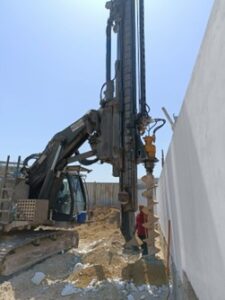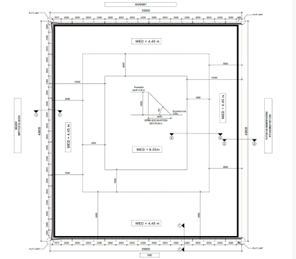


Tags:
Pile installation on a mixed-soil construction site in Dubai
With construction booming across Dubai, choosing the right foundation piling method is critical for both structural safety and project efficiency. Two commonly used techniques in the region are Continuous Flight Auger (CFA) piling and Rotary Bored piling. But which is more suitable for your project?
This article breaks down the differences between CFA and Rotary Bored piles, helping engineers, consultants, and contractors make informed decisions based on soil conditions and load requirements for foundation piling in Dubai.
CFA piling — or Continuous Flight Auger piling — is a cast-in-place method where a continuous auger drills into the soil while concrete is pumped through the auger’s hollow stem. The auger is then withdrawn, and a reinforcement cage is inserted into the still-wet concrete.
This method is commonly used in residential and mid-rise developments where speed, noise control, and cost-efficiency are important.
– Sandy soils and uniform ground layers
– Foundations for villas and mid-rise buildings
– Construction sites with noise or vibration sensitivity
– Areas with limited access or environmental restrictions
– Fast installation with minimal disruption
– Low noise and vibration – ideal for urban Dubai zones
– Economical for moderate load requirements
– Compliant with Dubai Municipality guidelines for residential works
– Depth limitations (typically effective up to 25 meters)
– Less suitable for mixed or hard soil layers
– Limited to smaller diameter piles compared to rotary bored methods
Rotary bored piling is one of the most trusted piling techniques for high-load structures and variable soil conditions. The method involves excavating a borehole using powerful rotary drilling rigs, installing reinforcement cages, and then pouring concrete.
It is a go-to solution for contractors and consultants working on towers, commercial complexes, bridges, and infrastructure projects across the UAE.
– Foundations for high-rise buildings and bridges
– Mixed or hard soil strata
– Locations requiring deep pile penetration (30m–60m+)
– Projects with large axial and lateral load demands
– Can reach greater depths than CFA
– Suitable for difficult soil and groundwater conditions
– Supports larger diameters and heavier structures
– Proven solution for Dubai’s most ambitious builds
– Slower installation than CFA
– Higher cost due to heavy equipment and longer cycles
– Requires more space and logistics planning on site
When selecting between CFA and Rotary Bored piling, your choice should be driven by:
– Soil investigation and geotechnical report
– Structural load requirements
– Site constraints and access conditions
– Environmental considerations (vibration, noise, etc.)
– Municipality and engineering approvals
At X.P.S Contracting, we analyze all these factors to recommend a piling solution that is structurally sound, cost-effective, and delivered on time.
Whether you need rapid CFA pile installation or deep foundation support through rotary bored methods, X.P.S Contracting provides:
– Certified engineering and design services
– Fully maintained piling rigs and equipment
– Compliance with Dubai and UAE regulatory frameworks
– End-to-end site management and execution
In Dubai’s complex soil environment, there is no one-size-fits-all approach to foundation piling. CFA is ideal for fast-track, light to medium load projects with noise constraints. Rotary bored piling excels in deeper, high-load, and technically demanding projects.
Choosing the right foundation solution ensures safety, performance, and compliance throughout your construction journey.
Need guidance on the right piling method for your Dubai project?
📞 Call us at +971 52 185 5331
📧 Email: info@xps.llc
🌐 Visit www.xps.llc

Introduction Dubai’s construction landscape is both dynamic and demanding — with record-breaking towers, deep basement excavations, and stringent…
Read More
Introduction Building a villa in Dubai’s residential zones comes with a unique set of challenges. Foundations must be…
Read More
Introduction Delays in shoring approvals can derail the entire construction timeline — particularly in fast-paced zones like Business…
Read More